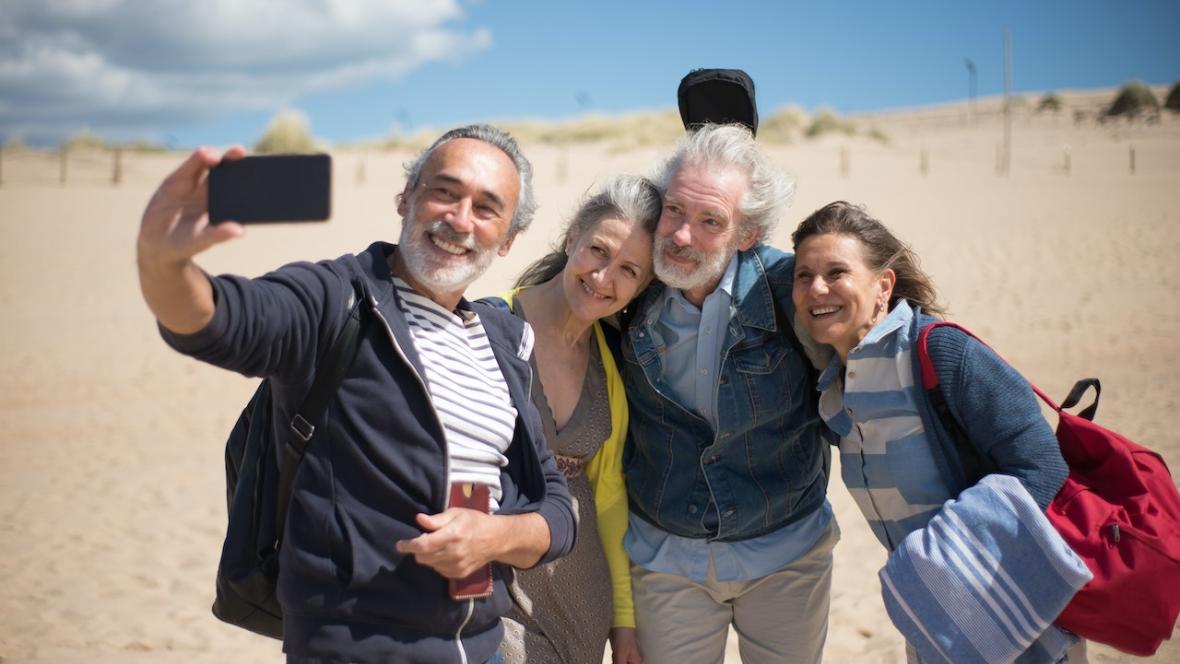Social interaction and activity for a healthy long-lived society. Fighting social disconnection

What is social disconnection?
According to the RAE, loneliness is defined as "Voluntary or involuntary lack of companionship". When we talk about voluntary solitude, we are referring to a solitude in which we can choose its duration and return to maintain sufficient interpersonal relationships whenever we want; far from harming us, voluntary solitude can be of great help at times in our lives when we need to reflect, when we need peace of mind, or at a time of personal growth.
On the other hand, there is also unwanted loneliness, which we could define as the situation where there is an absence or insufficient interpersonal relationships, a situation in which people feel that the quality, quantity or intensity of the social relationships they have are not sufficient to satisfy their social needs. How can we differentiate, in the first case we are facing a situation where we want to be alone, while in the second case it is a situation where although we would like to have company, to talk to someone, we cannot, so we feel "lonely".
Unwanted loneliness can affect our well-being and our state of health, as well as presenting other possible psychological, physical, social and economic difficulties. Unwanted loneliness is a feeling that predominates in people living in large cities, where the main group at risk are people over 65 years of age.
- In Spain, it is estimated that more than 2.5 million elderly people feel lonely, constituting almost 40% of those over 65 years of age, approximately 28.8% of elderly women and 14.7% of men live alone in our country. (Yanguas, 2019)
The aim of governments is to encourage the initiative of projects to prevent and combat unwanted loneliness, to achieve active and successful ageing, to provide quality of life for older adults and to avoid situations or illnesses that may affect their well-being and health. One of the ways to prevent these situations is by raising awareness among the population through programmes that try to develop social empathy towards the groups at risk. The main objective of these programmes should be to eliminate existing stereotypes and prejudices about the capacities and abilities of older adults, since several studies have determined that young people perceive old age as something negative, a perception that conditions the older adults they attend and, at the same time, conditions their way of seeing life as the years go by. All of these studies determine the importance of governments taking measures to eliminate and combat social isolation, especially in the elderly, in order to guarantee them a healthy ageing.
Human beings are sociable by nature and need social interaction, which keeps us active and positive as we feel connected to other people. If for young people, or middle-aged adults, socialising with other people is important, for older people it is much more important because as people get older it is normal that the number of people with whom they socialise decreases. It is important for older adults to remain positive and active, so socialisation should be encouraged. The benefits of maintaining sufficient social relations are many, among them:
- Improved mental health, by socialising with other people we can avoid and combat psychosocial pathologies, such as depression and anxiety.
- By socialising with people with whom you have an affinity, you develop a sense of belonging, which in turn gives you a sense of acceptance that makes you happier.
- By socialising, older people overcome their fears caused by the problems caused by the passing of the years, and thus improve their self-esteem by seeing themselves capable of doing other types of activities with like-minded people.
- It improves physical health, because when we have good conversations, or do activities that we enjoy while sharing with other people, our bodies release chemicals that stimulate the immune system to prevent disease and give a sense of wellbeing, as well as promoting an active lifestyle and improved nutritional intake.
- By interacting with more people, several studies have determined that there is an increase in cognitive functioning, conversations and brain activity are a very good tool to exercise the mind, which can reduce the risk of Alzheimer's and dementia.
- One of the most noticeable benefits is the "rejuvenation" that older adults experience when they have grandchildren, and this happens because it creates a sense of responsibility, which allows people to maintain a positive state of mind.
- When older adults are active, they feel that their life has a purpose, and spending time with the people we love makes their perception of life positive. Ending feelings of worthlessness
- Social activities and active social participation promote the physical and personal well-being of human beings because they decrease the risk of mortality in the elderly, which can extend their life span.
Don't you know them yet? Discover these programmes and tools to help us fight social disconnection.
Adopta un abuelo, is a programme based on creating relationships between young people and seniors, where both share time together. Thanks to this relationship, on the one hand, the elderly feel accompanied, loved and listened to, while the young people learn values and experiences from the elderly during the visits. It has an app and a website, where you can register, and through which you can make calls and organise visits or activities that will be developed in the future. to improve the quality of life of the elderly through its accompaniment services through its volunteers.
Started as an app for smartphones and tablets, it is now an intuitive mobile app for making calls, video calls and sending messages by tapping on the photo of the person you want to contact. It uses very large icons, making it an easy app for older people to use.
The large icons and touch screen make the Family Phone very easy to use for older people. It is a tool that gives peace of mind to carers and relatives of older people, knowing that they are connected at all times and promoting active aging.
This is an application that is available in more than 11 countries. Its intention is to create community by encouraging contact between neighbours in the same neighbourhood, an app that can also offer emotional and psychological support. The idea is to use technology to improve interaction between neighbours and organisations in order to have a neighbourhood that is united and has several people that can be trusted.
Proyecto “Conect@te Interener@cional: un día con los abuelos”
The idea is to implement them in residential centres in order to help interaction with spouses, friends and family by transmitting audiovisual documents from the members of the social network to the elderly through new information and communication technologies, while promoting active ageing.
It is a project in which tablets have been given to people over 65 years of age in order to put older people in immediate contact with their loved ones and to encourage their participation in community activities. Vincles "aims to strengthen the social relationships of older people who feel lonely and improve their well-being through technology and the support of social revitalisation teams".
Canal Senior is a web platform, through which organisations that have agreements with this association broadcast their activities through the internet, live and with interactivity in real time. It is a platform specialised in promoting the knowledge of senior citizens, through the use of the internet and new technologies, enabling citizens in general, and more specifically those in rural areas, to have knowledge at a click of a button.
Many municipalities in Spain have created programmes to address and combat unwanted loneliness, through organisations, institutions and professionals, such as Madrid and Vitoria-Gasteiz, the latter belonging since 2011 to the global network of age-friendly cities, a project led by the WHO to support and enable older people to remain active, live in safety, enjoy good health and participate in community life.
Radars is a project of the social services of Barcelona, and seeks to eradicate and prevent unwanted loneliness in the elderly, in this programme we work together with neighbours, shops, pharmacies, volunteers and organisations.
Familia abierta is a Galician project, in which the Franciscans of Galicia have agreed to dedicate some facilities to the service of the elderly, a group in need of attention and help. The project aims to offer a place, a way of life, time, means and management that will serve as a reference and awareness for future actions in the field of social needs. It is not a charity centre, but a space of solidarity and self-managed by the users themselves.
This is a programme in which each elderly person receives a weekly two-hour visit in a day centre, home or residence and a call from a volunteer, as well as in hospitals, as there are elderly people who do not receive visitors. During this time the elderly person breaks their usual routine of loneliness and can enjoy quality company, which keeps them entertained, the idea is to establish a bond of affection and trust between the elderly person and the volunteer.
Healthy and active ageing should be one of the main priorities of the different governments, guaranteed through projects and programmes to increase the quality of life of our seniors. Of course, beyond the different projects that local councils or private companies can set up, it is up to all of us to become aware of the reality of these people who have contributed so much to the society in which we live and to do our part to ensure that these programmes do not remain on paper and to ensure that we offer a dignified life for all, bearing in mind that we have various technological tools to do so.
Bibliography
- Arias, C. J., & Polizzi, L. (2011). La amistad en la vejez. Funciones de apoyo y atributos del vínculo. In III Congreso Internacional de Investigación y Práctica Profesional en Psicología XVIII Jornadas de Investigación Séptimo Encuentro de Investigadores en Psicología del MERCOSUR. Facultad de Psicología-Universidad de Buenos Aires.
-
Arnold, M. (2007). Exclusión social de los adultos mayores. In XXVI Congreso de la Asociación Latinoamericana de Sociología. Asociación Latinoamericana de Sociología.
-
Azpiazu, M., Jentoft, A., Villagrasa, J., Abanades, J., García, N., & Alvear, F. (2002). Factores asociados a mal estado de salud percibido o mala calidad de vida en personas mayores de 65 años. Revista Española de Salud Pública, 76, 683-699.
-
Carmona–Valdés, S. E., & Ribeiro–Ferreira, M. (2010). Actividades sociales y bienestar personal en el envejecimiento. Papeles de población, 16(65), 163-185.
-
Del Barrio, E., Castejón, P., Castiello, M. S., Tortosa, M. Á., Sundström, G., & Malmberg, B. (2010). La soledad de las personas mayores en España y Suecia: contexto y cultura. Revista española de geriatría y gerontología, 45(4), 189-195.
-
Delgado Losada, M. L., Súarez Castro, M., Pulido Manzanero, J., & Cea Soriano, L. (2022). Formación de agentes de prevención de la soledad: Acompañamiento y fomento de hábitos saludables para personas mayores en situación de soledad no deseada (ApS_Te_acompaño). Ene, 11, 00.
-
Facal, D., González, M. F., Buiza, C., Laskibar, I., Urdaneta, E., & Yanguas, J. J. (2009). Envejecimiento, deterioro cognitivo y lenguaje: Resultados del Estudio Longitudinal Donostia. Revista de Logopedia, Foniatría y Audiología, 29(1), 4-12.
-
Fernández-Ballesteros, R. (2011). Envejecimiento saludable. In Congreso sobre envejecimiento. La investigación en España (pp. 9-11).
-
Jiménez Rinza, J. L. (2012). Experiencias de adultos mayores ante programas de actividad física y socialización.
-
Santini, Z. I., Jose, P. E., Cornwell, E. Y., Koyanagi, A., Nielsen, L., Hinrichsen, C., ... & Koushede, V. (2020). Social disconnectedness, perceived isolation, and symptoms of depression and anxiety among older Americans (NSHAP): a longitudinal mediation analysis. The Lancet Public Health, 5(1), e62-e70.
-
Yanguas, J, Cilveti, A, Segura, C (2019). ¿A quiénes afecta la soledad y el aislamiento social? https://observatoriosociallacaixa.org/es/-/who-is-affected-by-lonelines…


